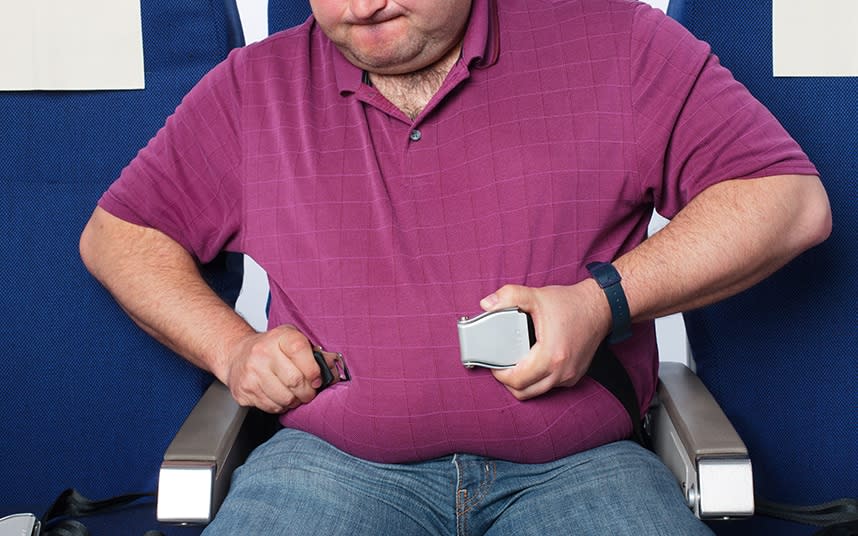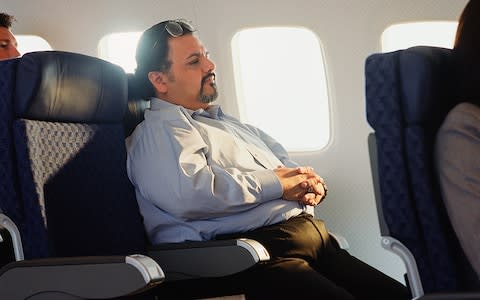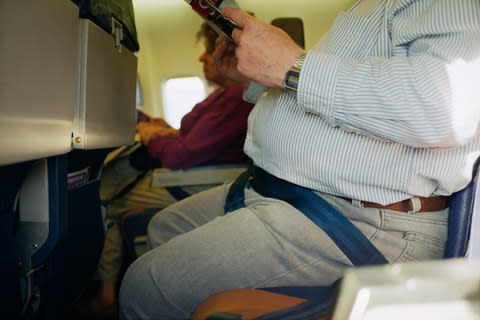Overweight fliers should pay more to fly and sit in their own section of the plane, says British public

Nearly 80 per cent of Britons believe overweight passengers should be placed in a separate seating area with bigger seats on a flight, while 91 per cent believe these travellers should be charged a higher fee for the larger seats, according to new research.
The survey of 2,494 people, conducted by comparison site Jetcost.co.uk, also revealed that some of Britain’s neighbouring countries shared the sentiment, with 72 per cent of travellers in France, 61 per cent in Italy and 56 per cent in Spain agreeing that larger passengers should pay more. Germany, however, disagreed, with 68 per cent of passengers saying sections with larger seats should not be offered on planes.
More than half of the British public were found to have endured a flight made uncomfortable by other people on the plane, with around a third (34 per cent) having not taken any action to address the situation and just over a fifth having moved seats to deal with the issue, the survey revealed.
Others were reported to have taken back the armrest "to claim back their space” as a way to tackle the problem, according to the survey.
The latest research follows numerous previous polls, including at least one conducted by Telegraph Travel, that have revealed an overwhelming support for a "fat tax", whereby larger travellers are forced to pay more.
“Having a separate area on the plane isn’t about segregating plus-sized passengers, it’s about making sure the flight is comfortable for everyone, not just those fortunate enough to fit into the standard sized seats,” a spokersperson for Jetcost.co.uk said.

“With wider aisles and seats, and more legroom in front, plus-sized passengers would be able to enjoy the flight far more, not having to worry about the person sat next to them, what they’re thinking and if they’re comfortable.”
Slimmer fliers should not have to pay for heavier passengers, according to Steve Miller, a speaker on weight loss and presenter from the documentary television programme Fat Families on Sky 1. He says requiring larger passengers to purchase two seats on a flight could potentially motivate them to lose weight.
Mapped: the world's most obese countries
“If you’re morbidly obese then it’s only fair that you pay more money - if someone else has been responsible and looked after their health, why should they subsidise someone else who weighs more,” he told The Sun.
“Who sat where would depend on the height to weight ratio of the passenger – airlines should create a software package where this was calculated when booking tickets, with spot checks later at the airport.
“Yes, it may put people off travelling but that’s a small price to pay.

“We have to introduce the stick as well as the carrot - so getting people to pay for two seats on an aeroplane is appropriate if they are too fat because there is something they can do about it,” he said.
While “plus size zones” might be sensible on planes for safety reasons, and would be less embarrassing for than getting stuck in a small seat, “we should support people to lose weight instead of creating segregation and making people feel ostracised,” Dr Sally Norton, an NHS consultant and weight loss expert, said.
Last year, Telegraph Travel published a piece from an anonymous American woman on what it’s like “to be the fat person on a plane”. Her heartfelt blog recounts weeks of fear, anxiety and sleepless nights, and that's before she's even stepped on the plane.
best seat on a plane
"There’s so much that happens before I even buy a ticket. I research policies, because every airline has one now for 'passengers of size.' All of them include the possibility that I will be charged double, or denied a seat on the plane on the day of the flight, leaving me to explain to my boss, partner, friend, family why they won’t be seeing me this week.”
In 2013, Samoa Air, the national airline of Samoa (which has one of the world's highest rates of obesity), became the first carrier to charge passengers by weight, asking fliers to pay a fixed price per kilogram, which varies according to the length of the route. Passengers nominate their weight and are measured, along with their baggage, on scales at the airport.
The airline also introduced an ‘XL class’ for larger passengers - a wider row on its aircrafts for passengers who weigh more than 286 pounds (130 kilograms).